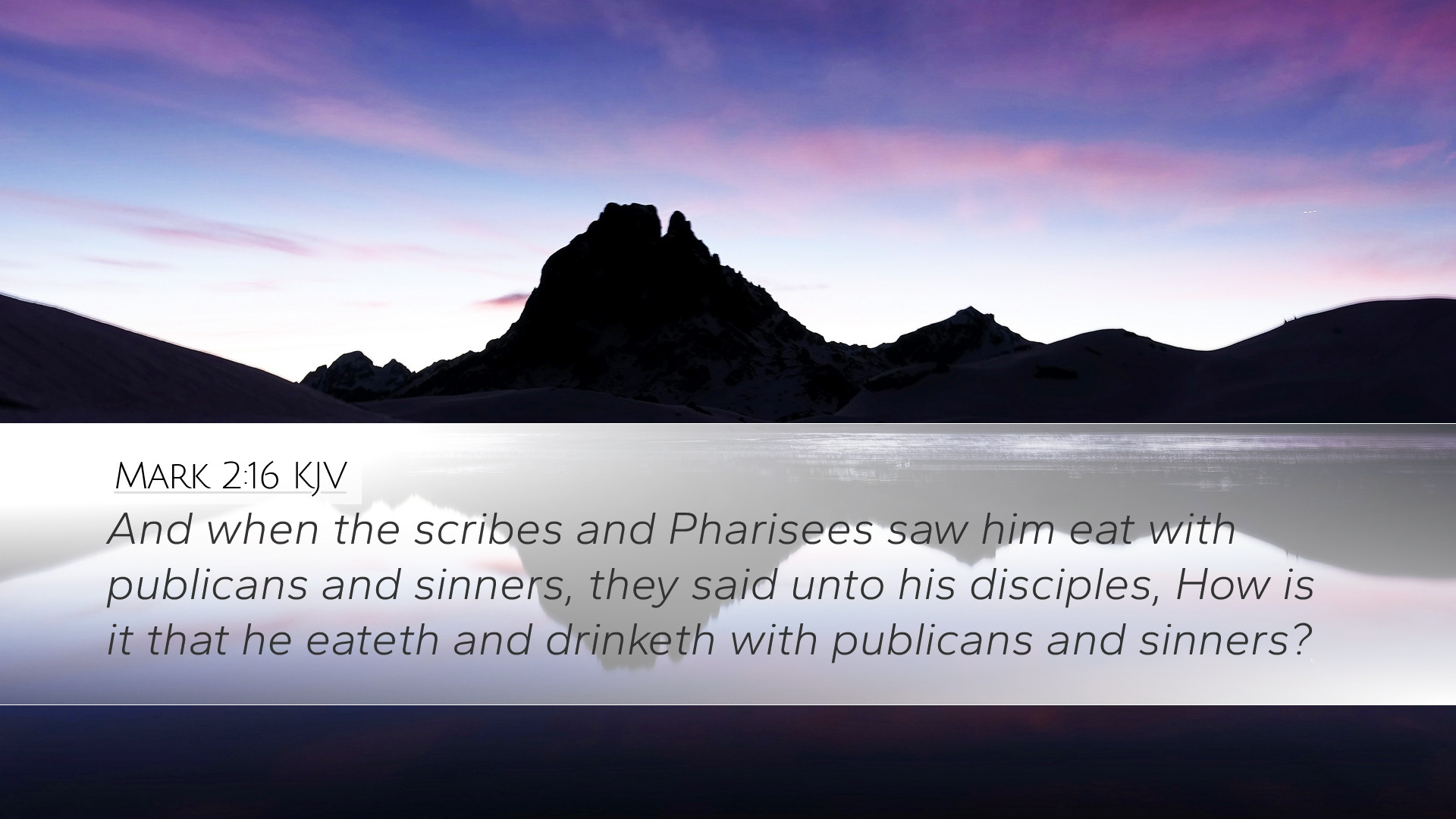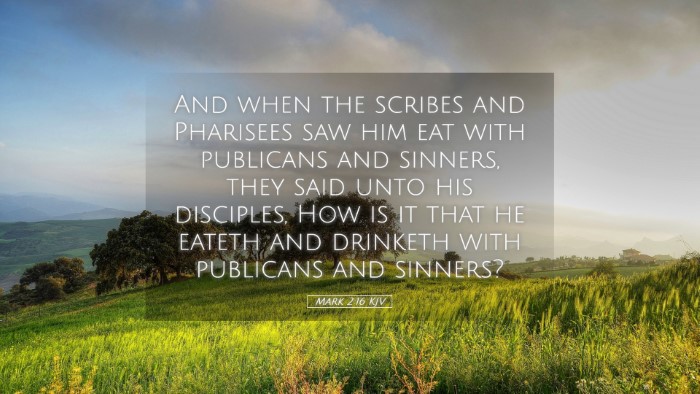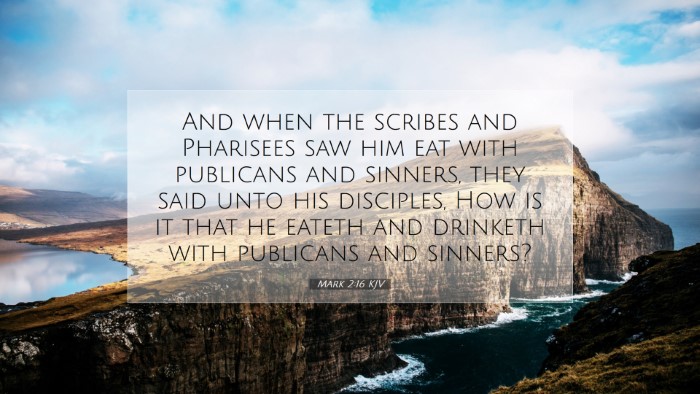Old Testament
Genesis Exodus Leviticus Numbers Deuteronomy Joshua Judges Ruth 1 Samuel 2 Samuel 1 Kings 2 Kings 1 Chronicles 2 Chronicles Ezra Nehemiah Esther Job Psalms Proverbs Ecclesiastes Song of Solomon Isaiah Jeremiah Lamentations Ezekiel Daniel Hosea Joel Amos Obadiah Jonah Micah Nahum Habakkuk Zephaniah Haggai Zechariah MalachiMark 2:16
Mark 2:16 KJV
And when the scribes and Pharisees saw him eat with publicans and sinners, they said unto his disciples, How is it that he eateth and drinketh with publicans and sinners?
Mark 2:16 Bible Commentary
Commentary on Mark 2:16
Verse Context: Mark 2:16 (KJV) states, "And when the scribes and Pharisees saw him eat with publicans and sinners, they said unto his disciples, How is it that he eateth and drinketh with publicans and sinners?" This verse captures a critical moment in the ministry of Jesus, highlighting the tension between religious leaders and the mission of Christ.
1. The Reaction of the Scribes and Pharisees
The scribes and Pharisees, representing the established religious order, were notorious for their strict adherence to the Law and their disdain for those they considered unholy. Their question reveals their shock and disapproval of Jesus' association with publicans (tax collectors) and sinners, who were viewed as outcasts in Jewish society.
- Religious Elitism: Albert Barnes notes that the disdain of the Pharisees toward publicans and sinners was rooted in their belief that they were more holy than others. Their question betrays a sense of superiority, showcasing their inability to grasp the essence of Jesus’ mission.
- Cultural Context: Adam Clarke emphasizes that eating with someone in the Jewish culture signified acceptance and fellowship. For the Pharisees to see Jesus sharing a meal with such individuals was inconceivable, as it implied that he endorsed their lifestyle.
2. Understanding 'Publicans' and 'Sinners'
In this context, 'publicans' were often seen as traitors collaborating with the Roman oppressors for profit. 'Sinners' encompassed a broader category, including those who lived in moral transgression against societal or religious norms.
- The Role of Publicans: Matthew Henry points out the publicans' role as more than mere tax collectors; they were often associated with fraud and extortion, which lent to their unpopularity among the Jews.
- Who are the Sinners? Clarke further explains that 'sinners' likely referred to individuals involved in various immoral acts, including prostitution, theft, and any lifestyle deemed unclean by the Pharisaical standards. This categorization fortified the Pharisees' propensity to judge.
3. Jesus' Ministry and Its Implications
Jesus’ choice to associate with outcasts, as highlighted in this verse, is fundamental to understanding his earthly ministry. Unlike the Pharisees, who segregated themselves to maintain ritual purity, Jesus exemplified a different approach—one of mercy and redemption.
- Jesus’ Mission: Barnes remarks that Jesus came to seek and save that which was lost (cf. Luke 19:10). His methodology involved engaging with those who acknowledged their need for salvation, in sharp contrast to the self-righteousness of the religious elite.
- Societal Reformation: Henry notes that through his actions, Jesus called for a reformation not only of individuals' lives but also the societal structures that marginalized these individuals. His company with sinners was both a declaration of their value and an invitation to repentance.
4. Theological Reflection
This moment in Mark 2:16 raises critical theological questions about holiness, grace, and the nature of the church. How does one reconcile the call to holiness with the mission of outreach and acceptance?
- Holiness vs. Acceptance: Matthew Henry illustrates the importance of both holiness and compassion in ministry. The Pharisees confused the two, leading to a critical imbalance that Jesus passionately confronted.
- Grace Extended: This passage serves as a poignant reminder of the grace extended by Christ towards those deemed unacceptable. Adam Clarke asserts that the heart of the Gospel is the radical acceptance of those who recognize their brokenness.
5. Application for Today
As modern readers and believers of the Gospel, Mark 2:16 challenges us to reflect on our attitudes towards those society labels as 'sinners'. Are we, like the Pharisees, quick to judge? Or are we willing to embrace the heart of Christ, who broke cultural barriers to extend grace?
- Engagement in a Broken World: The church today is called to engage with those on the fringes of society, reflecting the inclusive nature of Jesus’ ministry.
- Embracing Diversity: It is imperative for believers to recognize the diversity of the human experience and to respond with compassion rather than judgment, following Christ’s example.
- Invitation to Repentance: Our ministry must not only welcome but also call individuals toward transformation and repentance, echoing Jesus’ love and truth.
Conclusion
Mark 2:16 serves as a challenging reminder of the radical love of Christ. In his interactions with publicans and sinners, Jesus offers a model of ministry that emphasizes grace, acceptance, and the pursuit of genuine relationship over religious elitism. As we reflect on this passage, may we be inspired to embody the same love and acceptance in our journey of faith.


